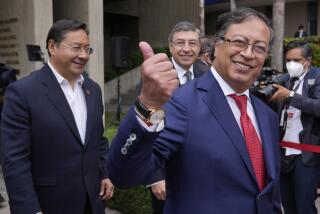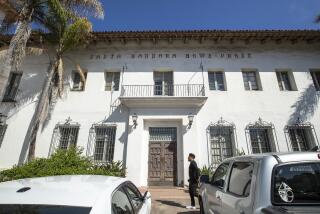La Prensa Returns, Warns Sandinistas : Silence of Opposition Managua Paper Ends With Blunt Editorial
- Share via
MANAGUA, Nicaragua — The opposition newspaper La Prensa resumed publication Thursday after 15 months of imposed silence with a warning to the Sandinista government: “Nicaraguans do not want a Communist-style totalitarian dictatorship.”
The newspaper’s reappearance and its blunt front-page editorial marked a revival of open ideological conflict between the leftist government and its conservative political foes after months of war-time censorship.
Under a Central American peace agreement signed Aug. 7, the government is obliged to permit full press and political freedom by Nov. 7. The accord also requires the United States and other countries to stop aiding the Nicaraguan contras.
Last month, the Sandinistas agreed to allow La Prensa to publish without censorship and also lifted a ban that has kept the Roman Catholic station, Radio Catolica, off the air for 21 months. The station is to resume broadcasts today.
Although a wartime state of emergency remains in force, the police relaxed it Sunday to let more than 2,000 supporters of the Social Christian Party march through Managua in the largest anti-Sandinista gathering in three years.
Of all the sudden changes, La Prensa’s reopening was the most eagerly awaited by opposition leaders, who hope to use the new freedom to end Sandinista rule.
As foreign diplomats and leading dissidents gathered in a steaming hot pressroom, three Roman Catholic priests blessed the paper’s 19-year-old Goss press. Cristiana Chamorro, an editor, pushed a button to start printing 200,000 copies of the first issue.
Hundreds of people lined up outside the paper’s offices to buy copies.
“The people of Nicaragua are jubilant because the government has taken off the muzzle and now we can read the truth,” said Alberto Zapata, a construction worker who was among them.
La Prensa, a conservative afternoon daily, was closed by the government June 26, 1986, a day after the U.S. Congress approved $100 million in contra aid. The Sandinistas accused it of “justifying U.S. aggression.”
On Thursday, the paper reopened with a front-page banner headline: “The People Triumph.”
“Today, after more than a year of unjust imprisonment, La Prensa has returned,” Violeta Barrios de Chamorro wrote in a publisher’s message. “For how long, we don’t know.”
The 12-page issue carried messages of support from Costa Rican President Oscar Arias Sanchez, author of the peace accord, and Cardinal Miguel Obando y Bravo, a leading critic of the Sandinistas. Its news coverage was heavily slanted toward demands that opposition parties will take to a “dialogue” with the government next Monday in another step required by the peace agreement.
$7 Billion Missing
The only news item in Thursday’s La Prensa that a Nicaraguan could not read in one of the two pro-government papers was the allegation by a businessman’s group that $7 billion borrowed by the Sandinistas abroad cannot be accounted for.
But the editorial columns were different. While voicing support for the peace agreement, they sounded some of the same militant anti-Sandinista themes that led the government to close the paper.
The lead editorial did not mention U.S. support for the contras. Instead, it blamed the war on “errors and political detours” by the Sandinistas. It said they had betrayed their own democratic revolution by turning leftward after ousting the Somoza family dynasty in 1979.
“In the name of the people, La Prensa says today to the Sandinista National Liberation Front: Nicaraguans never have wanted, do not want and will never want a Communist-style totalitarian dictatorship,” the editorial said. “If 45 years of struggle against the Somozas did not tire the Nicaraguans, eight years of this new effort to subject them to tyranny will not have the least possibility of success.”
In a speech Wednesday night, President Daniel Ortega defended the new press and political freedoms. He urged Sandinista militants to “prepare for an ideological struggle, because the combat does not end at the war front.”
“It is easier to fight an ideological struggle against an enemy who has no possibility for expressing himself,” Ortega said. “But it is richer for the revolutionary process to fight an ideological struggle against the enemy if we give him the possibility to express himself.”
More to Read
Sign up for Essential California
The most important California stories and recommendations in your inbox every morning.
You may occasionally receive promotional content from the Los Angeles Times.









